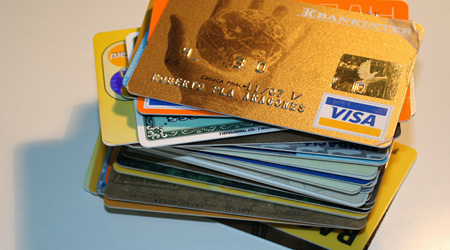How To Use Your Credit Card Wisely

Credit cards offer an invaluable opportunity to develop a solid financial foundation which can either positively or negatively impact your financial well being. Used wisely, credit cards can be the basis for for getting the best interest rate on a mortgage or automobile loan. Your credit history, which for most people consists of credit cards, can also be viewed by prospective employers, insurance companies and utility companies. Your very first credit card sets the financial course for which you will be judged as trustworthy and responsible.
Finance Charges
A credit card is what referred to as a revolving line of credit. That means the terms of the credit card issuer will loan you money to pay for an item, like a TV, and at a predetermined point in the future you will repay the loan principle plus an additional finance charge if not paid in full. This can be great if you find a deal but don't get paid until next week. You buy it today and pay for it later.
Problems occur when credit card holders continue to make additional purchases and subsequently do not pay the balance off every month. Finance charges accrue on the outstanding balance and compound month to month. This can make a relatively small balance balloon into a huge problem if it is not watched closely.
Timely Payment
Even if you can't pay the balance in full each month it is incredibly important to pay at least the minimum amount due. Late payments are reported to the three major credit reporting agencies, Experian, TransUnion and Equifax, and can ruin future credit possibilities. If future potential creditors see a spotty credit payment history it raises red flags and may limit available credit.
It may appear that as a consumer you assume more debt than you are realistically able to repay. A potential creditor may worry that if you are unable to make consistent payments on your current obligations what is the likelihood that you will be able to make payments on yet another loan. While minimum payments are bad in terms of accruing finance charges, late payments are worse.
Penalties
Penalties can make a bad situation worse. At a certain point in time when payments are past due certain penalties kick in. The most common is called a Universal Default interest rate hike. This is where the great interest rate you once had at 8.9% can suddenly spike to 25% or higher. If making payments was difficult before, it is nearly impossible at a higher interest rate.
Late payment and overdraft penalties are also added to the principle balance and compound going forward. If it looks like things are getting out of control be sure to contact the credit card issuer early on. Most creditors will work with card holders if given the chance and can make adjustments such as lowering the credit limit on the card, waiving fees if a payment plan is adopted and lower the interest rate after a successful number of consecutive payments are made on time.
Summary
A credit card can be your best friend or worst enemy. Used wisely, credit cards establish a solid credit history which can lead to better interest rates and potentially large amounts of available credit. It can also lead to better a living and working environment by showing potential landlords and employers how responsible you are.
But using a credit card poorly like maxing out the credit limit on a brand new card and then not making payments on time will most likely be a nightmare. And it doesn't go away either. Credit issuers can sue to garnish wages or sell the debt to third party collection agencies. The key is to make credit cards work for you by letting others know you can manage debt wisely.







